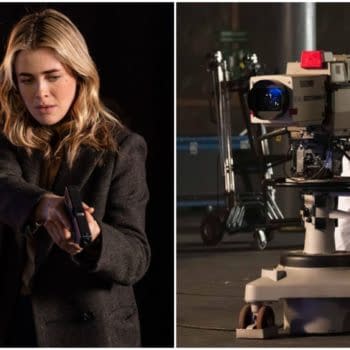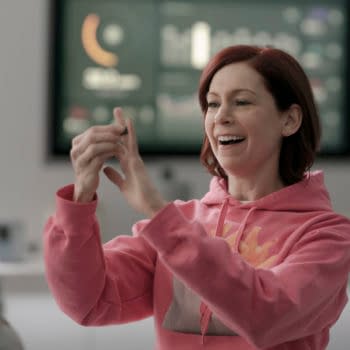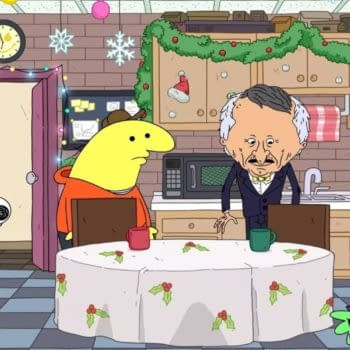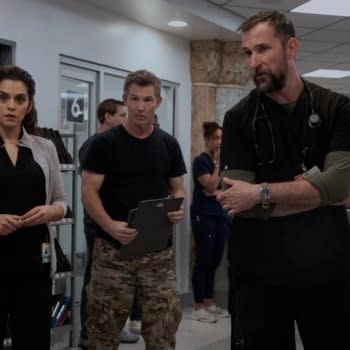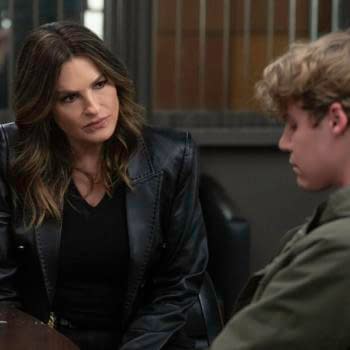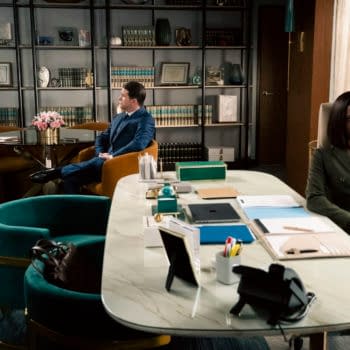Posted in: FX, Hulu, streaming, TV | Tagged: always sunny, fx networks, FXX, iasip, It's Always Sunny In Philadelphia
It's Always Sunny in Philadelphia: The Gang Hits 18 (Happy Birthday!)
With FXX's It's Always Sunny in Philadelphia hitting 18 today, we look at our favorite ep, least favorite ep, and the one that started it all.
On August 4, 2005, the television landscape would shift dramatically – and never be the same. Because that's when the doors to Paddy's were officially thrown open with S01E01 "The Gang Gets Racist" (directed by John Fortenberry and written by Charlie Day & Rob McElhenney). Sixteen seasons and eighteen years later, FXX's Rob McElhenney, Charlie Day, Glenn Howerton, Kaitlin Olson, and Danny DeVito -starring It's Always Sunny in Philadelphia is going as strong as ever. Unfortunately, because of the ongoing SAG-AFTRA & WGA strikes, The Gang's real-life counterparts can't publically join in on the festivities. But that doesn't mean we can't take a look back to share what's still our favorite episode of the series (though that gets harder & harder each year) as well as The Gang discussing its influence. From there? Yes, we also look back to what is still our least favorite IASIP episode – and it's still not even close
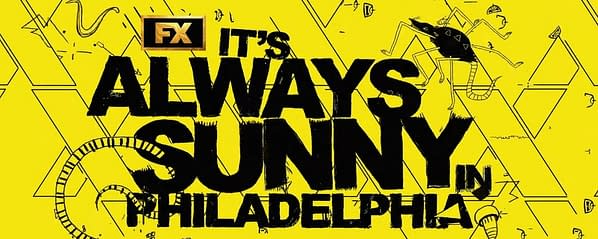
But first, here's a look at a scene from that very first episode that FX Networks released earlier today:
It's Always Sunny in Philadelphia S04E13 "The Nightman Cometh!"
Even after sixteen seasons, our favorite episode of the series run hasn't changed. Do I really need to explain why this episode would rise above so many other worthy contenders? The episode has achieved Rocky Horror Picture Show status – in fact, you probably either hummed or sang the song to yourself at least once by the time you read this. Here's a look at what Day, Howerton, McElhenney, Olson, DeVito, episode director Matt Shakman (WandaVision), and others had to share about how the episode came to be, what it was like performing live, and their thoughts on the episode's endurance even after all of this time:
On the risk of doing a musical episode that comedically blurs the line between "a boy's coming of age story" and a story about pedophilia and rape and how the show handled it seriously, Day explained, "Any time we deal with that kind of subject matter, I like to think it's coming from a more intelligent place. A rape joke is not remotely a funny thing; a man writing a musical that he thinks is about self-empowerment, and not realizing that all his lyrics sound like they're about a child being molested, is a funny thing. The joke is coming from confusion and misunderstanding, which are classic tropes of all comedy." Olson followed up, "We look back at some of our past shows and wonder if we'd still be able to do that. I hope the answer is yes because if you're paying attention, we're pretty good people with fairly liberal views on things. We're making a social commentary."
Thankfully, the cast had enough collective musical experience to make the episode's creative process a little easier. Well, almost everyone had musical experience. "I'm not musically inclined in any way, shape, or form. But Charlie is an incredible musician, so he and [composer] Cormac Bluestone wrote the majority of the music. In terms of lyrics, we all had a hand in them. But Charlie definitely took the lead," explained McElhenney.
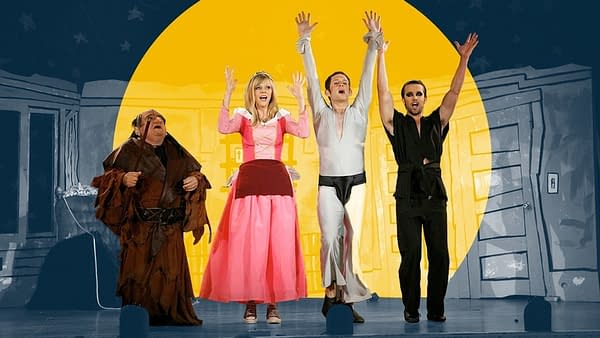
Working with piano player Gladys (Mae LaBorde), who was constantly confused over what exactly she was playing piano for – represented a "first" for Shakman. Day explains, "They would say "action" and she was just, like, talking. She would tell us that we're all wonderful, beautiful people and she was happy to be there. Which was really charming but also very funny, because she had lines and she wasn't saying them." For Shakman, LaBorde represented one of his longer filming experiences: "When you get to be as old as she was, you can do whatever you want… Just getting the lines out was very difficult. I remember being backstage with her, talking about Calvin Coolidge, she just went on for so long. It might've been the longest scene I've ever shot for Sunny."
Performing 'The Nightman Cometh' on the road for a mini-tour of six cities (New York, L.A., San Francisco, Seattle, Boston, and Philadelphia) gave DeVito an opportunity to perform where his career first started: "We played the Beacon Theatre in New York, where I once saw Bob Marley play in the early '70s. I lived on 89th Street when I was starting out, so this was my home turf. I invited everybody I could think of to come. Some of my friends came backstage; they were like deer in headlights. They had no idea what was going on." For Olson, the live shows gave the cast a better understanding of how strong and loyal their fanbase was: "It really gave us our first insight into just how many fans we had. Because we were basically being told: Nobody's watching the show, but FX likes it, so that's why you're still on the air. We weren't having huge ratings, but we had a big fan base. And those people traveled and packed those theaters."
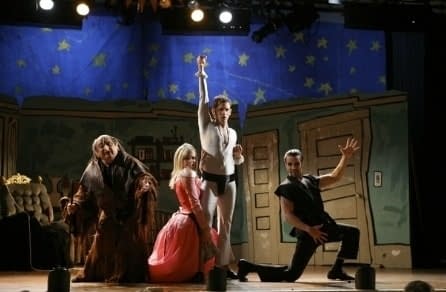
So why has 'The Nightman Cometh' not only endured but grown in popularity over the years? For McElhenney, it was something different that kept to the heart and spirit of the series while also showing a little heart: "Ultimately, in a show that is so inherently profane—and the characters are so difficult and hard to watch at times—the ending of that particular episode was very sweet. You find out that Charlie's doing the whole thing because he's in love with somebody, and he's asking her to marry him. Of course, the Sunny version of that is that the relationship is exceptionally unhealthy and that she says no, but I think his motivation comes from a really sweet place. So that buys us a lot in the episode. Also, like it or hate it, we've always strived to do something that nobody else is doing, and I think some people respond to that. It just feels very specific to us and to the show."
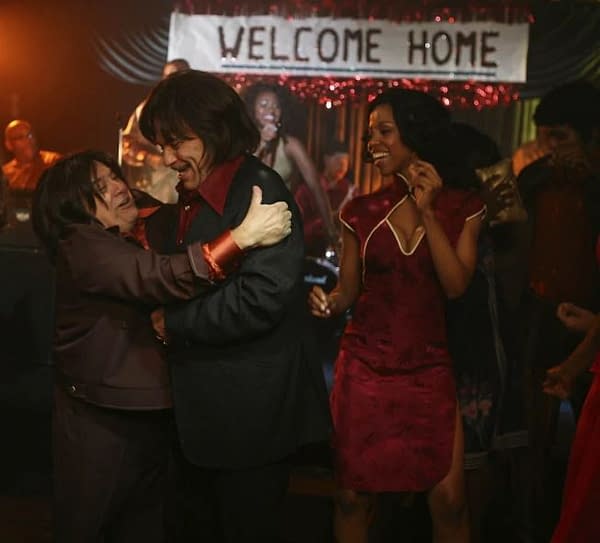
Season 7 Episode 5: "Frank's Brother" – Ouch
As for our "big lump of coal" – the worst It's Always Sunny in Philadelphia episode of all time? Yes, the same person who directed our best episode also directed our worst: S07E05: "Frank's Brother" (written by David Hornsby, aka Cricket). Hey, it happens. But just to be clear? This isn't one of those "gets better with age" examples or "so bad it's good" kind – it just stinks on oh so many levels. The late Jon Polito pulled together an impressive body of film and television work during his career – but as Frank's brother Gino? Not so good – same thing with how Frank is represented in the episode. From a backstory that doesn't gel with what we know from previous episodes to the jokes to the overall pacing, everything seems off – like an episode put together by fans who think they can do a better It's Always Sunny in Philadelphia episode.




